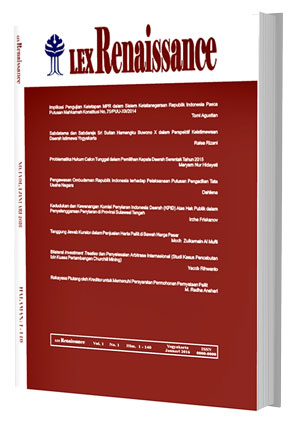Main Article Content
Abstract
Abstract
The focus of this study is to explain the implications of their subrogation by granting power of attorney
involved in the transition lastgeving land rights and outlining efforts to settle the implications of the
implementation of the application of subrogation by giving power of attorney lastgeving in the turnover
of land rights. This research is a normative approach doctrinal and non-doctrinal. Results showed
positive implications, namely the debt of the debtor be paid, the creditor will obtain repayment of debt
and the third party will acquire the land and building. The implication negative is about the costs,
expenses and Roya who from the beginning was not discussed so that a dispute exists between the
seller and the buyer, not made a deed of power of a debt by a notary during the process of debt
repayment in the bank, bad credit by the purchaser which replaced debtors, banks that do not receive
transition without notice to the bank first. For his efforts in general notary prepare and notify to the parties
to the costs of the burden of transition, the cost Roya, on payment of taxes, as well as supplies of
administration, and the notary from the beginning to tell and gives advice on the consequences that
ensue for the switchover without the knowledge of the bank so that no losses of the parties in the future.
Keywords: Subrogation, Authorization Deed Lastgeving, Transfer of Rights to Land
Article Details
Authors who publish with this journal agree to the following terms:
a. Authors retain copyright and grant the journal right of first publication with the work simultaneously licensed under a Creative Commons Attribution License that allows others to share the work with an acknowledgement of the work's authorship and initial publication in this journal.
b. Authors are able to enter into separate, additional contractual arrangements for the non-exclusive distribution of the journal's published version of the work (e.g., post it to an institutional repository or publish it in a book), with an acknowledgement of its initial publication in this journal.
c. Authors are permitted and encouraged to post their work online (e.g., in institutional repositories or on their website) prior to and during the submission process, as it can lead to productive exchanges, as well as earlier and greater citation of published work (See The Effect of Open Access).



